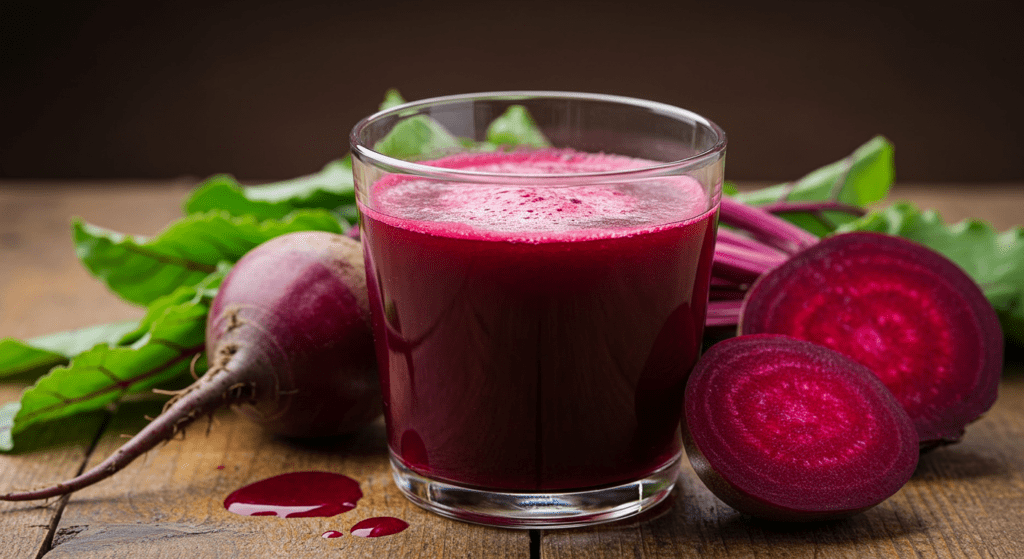Table of Contents
- Introduction
- Nutritional Profile of Beetroot Juice
- Health Benefits of Drinking Beetroot Juice
- Boosts Cardiovascular Health
- Enhances Athletic Performance
- Supports Liver Detoxification
- Improves Cognitive Function
- How to Incorporate Beetroot Juice into Your Diet
- Potential Side Effects and Precautions
- Conclusion
- FAQs
Introduction
Beetroot juice has gained significant attention in recent years due to its impressive health benefits and rich nutritional profile. Packed with essential vitamins, minerals, and antioxidants, this vibrant red juice is more than just a trendy health drink. From improving heart health to enhancing athletic performance, beetroot juice offers a wide range of advantages. In this article, we’ll explore the science-backed benefits of beetroot juice, how to include it in your diet, and answer some common questions about this superfood.

Nutritional Profile of Beetroot Juice
Beetroot juice is a nutrient-dense beverage that provides a variety of essential vitamins and minerals. Key nutrients include:
- Nitrates: Converted into nitric oxide, which improves blood flow.
- Vitamin C: Supports immune function and skin health.
- Folate (Vitamin B9): Essential for cell growth and development.
- Iron: Helps in the production of red blood cells.
- Potassium: Regulates blood pressure and fluid balance.
- Antioxidants: Betalains, which give beetroot its vibrant color, help combat oxidative stress.
Health Benefits of Drinking Beetroot Juice
1. Boosts Cardiovascular Health
Beetroot juice is renowned for its ability to support heart health. The high nitrate content in beetroot juice is converted into nitric oxide in the body, which helps relax and dilate blood vessels. This process improves blood flow, reduces blood pressure, and lowers the risk of heart disease.
2. Enhances Athletic Performance
Athletes often turn to beetroot juice as a natural performance enhancer. Studies have shown that the nitrates in beetroot juice can improve oxygen utilization, increase stamina, and reduce fatigue during physical activities. This makes it an excellent choice for endurance athletes.
3. Supports Liver Detoxification
The antioxidants in beetroot juice, particularly betalains, support liver function by promoting detoxification and reducing inflammation. Regular consumption of beetroot juice can help protect the liver from oxidative damage and improve its ability to process toxins.
4. Improves Cognitive Function
The nitric oxide produced from beetroot juice not only benefits the cardiovascular system but also enhances brain function. Improved blood flow to the brain can boost cognitive performance, memory, and focus, making beetroot juice a great addition to your diet for mental clarity.
How to Incorporate Beetroot Juice into Your Diet
Adding beetroot juice to your daily routine is simple and versatile. Here are some ideas:
- Drink it plain or mix it with other juices like apple or carrot for added flavor.
- Blend it into smoothies with fruits and leafy greens.
- Use it as a base for soups or salad dressings.
- Start with small quantities (50-100 ml) to allow your body to adjust.
Potential Side Effects and Precautions
While beetroot juice is generally safe for most people, there are a few considerations:
- Beeturia: Some individuals may notice red or pink urine after consuming beetroot juice, which is harmless.
- Kidney Stones: Beetroot is high in oxalates, which may contribute to kidney stones in susceptible individuals.
- Low Blood Pressure: Those with already low blood pressure should monitor their intake, as beetroot juice can further lower blood pressure.
- Allergies: Rarely, some people may experience allergic reactions to beetroot.
Conclusion
Beetroot juice is a powerhouse of nutrients and offers numerous health benefits, from improving heart health to boosting athletic performance. Its rich antioxidant content and ability to enhance blood flow make it a valuable addition to any diet. However, it’s important to consume it in moderation and be aware of potential side effects. By incorporating beetroot juice into your daily routine, you can take a proactive step toward better health and well-being.
FAQs
1. How much beetroot juice should I drink daily?
Aim for 50-250 ml per day, depending on your tolerance and health goals. Start with smaller amounts and gradually increase.
2. Can beetroot juice lower blood pressure?
Yes, the nitrates in beetroot juice can help lower blood pressure by improving blood vessel function.
3. Is beetroot juice safe for pregnant women?
Yes, beetroot juice is safe during pregnancy and provides essential nutrients like folate. However, consult your doctor before making significant dietary changes.
4. Can I drink beetroot juice on an empty stomach?
Yes, drinking beetroot juice on an empty stomach can enhance nutrient absorption, but some people may experience stomach discomfort.
5. Does beetroot juice help with weight loss?
While beetroot juice is low in calories and high in nutrients, it should be part of a balanced diet and exercise routine for effective weight management.